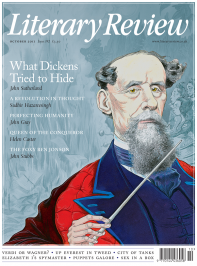Christopher Andrew
Spies Like Us
Greek Memories
By Compton Mackenzie
Biteback 304pp £19.99
The reappearance, almost eighty years after it was banned, of the uncensored version of Greek Memories, Compton Mackenzie’s memoir of his time as MI6 – then MI1(c) – head of station in Athens in the middle of the First World War, is something of a literary event. Its original publication in 1932 led to Mackenzie's conviction under the Official Secrets Act.
Among Mackenzie’s alleged offences was to have revealed the identity of the first Chief of MI6, Sir Mansfield Cumming. When Mackenzie was posted to Athens, even he did not know Cumming’s identity and was told to refer to the Chief simply as ‘C’ (a designation still used by today’s

Sign Up to our newsletter
Receive free articles, highlights from the archive, news, details of prizes, and much more.@Lit_Review
Follow Literary Review on Twitter
Twitter Feed
It wasn’t until 1825 that Pepys’s diary became available for the first time. How it was eventually decrypted and published is a story of subterfuge and duplicity.
Kate Loveman tells the tale.
Kate Loveman - Publishing Pepys
Kate Loveman: Publishing Pepys
literaryreview.co.uk
Arthur Christopher Benson was a pillar of the Edwardian establishment. He was supremely well connected. As his newly published diaries reveal, he was also riotously indiscreet.
Piers Brendon compares Benson’s journals to others from the 20th century.
Piers Brendon - Land of Dopes & Tories
Piers Brendon: Land of Dopes & Tories - The Benson Diaries: Selections from the Diary of Arthur Christopher Benson by Eamon Duffy & Ronald Hyam (edd)
literaryreview.co.uk
Of the siblings Gwen and Augustus John, it is Augustus who has commanded most attention from collectors and connoisseurs.
Was he really the finer artist, asks Tanya Harrod, or is it time Gwen emerged from her brother’s shadow?
Tanya Harrod - Cut from the Same Canvas
Tanya Harrod: Cut from the Same Canvas - Artists, Siblings, Visionaries: The Lives and Loves of Gwen and Augustus John by Judith Mackrell
literaryreview.co.uk